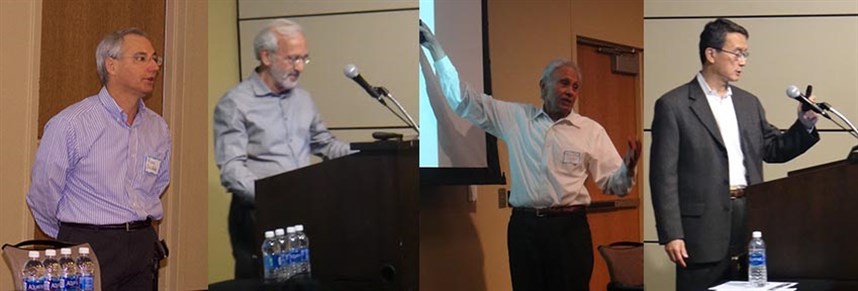 In the coming years, the United States’ electric power grid will undergo a transformation as wind and solar energy become more prevalent in helping to meet the nation’s energy requirements.
In the coming years, the United States’ electric power grid will undergo a transformation as wind and solar energy become more prevalent in helping to meet the nation’s energy requirements.
The Grid-X initiative at Texas A&M University is addressing all these cutting edge challenges that hold the promise of revolutionizing the electric power industry.
The “Workshop on Architecture and Economics of the Future Grid,” was recently hosted by members of the initiative to showcase world-leading experts who shared their experience, research and vision for the future of the electric grid.
 It is predicted that homes of the future will be equipped with solar panels that are net producers of energy when the sun is shining, rather than always being net consumers. These renewable energy sources are unpredictable, so residential, commercial and industrial consumers will need to adjust consumption. This is in contrast to the current situation where supply is ramped up or down according to demand. Additionally, meters will need to be smart to bill consumers not just by total energy consumed, but by how much they consume, at what times and under scarcity conditions.
It is predicted that homes of the future will be equipped with solar panels that are net producers of energy when the sun is shining, rather than always being net consumers. These renewable energy sources are unpredictable, so residential, commercial and industrial consumers will need to adjust consumption. This is in contrast to the current situation where supply is ramped up or down according to demand. Additionally, meters will need to be smart to bill consumers not just by total energy consumed, but by how much they consume, at what times and under scarcity conditions.
To serve as intermediaries in this process, new business models of "load serving entities" are emerging. This requires a rethinking of how electric power is priced, both at the wholesale generation level as well as at the retail consumer level. A smarter grid is needed to provide the appropriate information on the state of the grid to all participating real-time decision makers to prevent instabilities as well as increase efficiency.
During the workshop, Dr. Ross Baldick (left) from the Department of Electrical and Computer Engineering at The University of Texas at Austin discussed “Ancillary Services in the Context of the Full Cost of the Electricity Project,” and “Wind Variability and Impact on Markets.” In these presentations, he discussed the recent transition of ERCOT from zonal to nodal market structure and its impact on reserve markets, as well as the observed and potential impacts of increased wind production in Texas.
Dr. Michael Caramanis (left center) from the Department of Mechanical Engineering and Division of Systems Engineering at Boston University presented on “Dynamic Locational Marginal Cost of Power Services on Distribution Networks with Price Adaptive Distributed Energy Resources,” and “Strategic Behavior in Energy and Reserve Co-optimizing Markets with Distributed Energy Resource (DER) Participation.” He detailed some of the complexities presented by distributed energy resources such as solar power and potential market structures and operation.
Dr. Pravin Varaiya (right center), Nortel Networks Distinguished Professor in the Department of Electrical Engineering at the University of California, Berkeley, considered the impacts of virtual bidding on the ERCOT market and described a method for “Achieving Optimal Stochastic Dispatch through Direct Multilateral Trades.” He concluded that introducing virtual bidding had increased market efficiency and presented a model describing the impacts of virtual bidding on market operation.
Dr. David Sun (right), chief scientist at The Glarus Group, presented “The Art and Science of Power System Optimization Applications,” and “Grid 3.0: DER-enabled Industry Transformation.” He shared his experience and advice about the art of connecting research results to business applications and discussed his views on how distributed energy resources will transform the electric grid.
Graduate students and postdoctoral students participating in the Texas A&M Grid-X Research Program also shared their work, covering a wide range of topics, including demand response, methods of operation for participants in future markets, alternative market structures, data-driven learning from market and PMU data and economically accounting for variability of renewables.
Nearly 100 people attended the workshop, including participants from Texas A&M, The University of Texas at Austin, Boston University, the University of California-Berkeley, ERCOT, ABB, CenterPoint Energy and The Glarus Group.
Dr. Hung-Ming Chou, Dr. P.R. Kumar and Dr. Le Xie organized the workshop. Presentation slides are available at speakerdeck.com/gridxtamu.